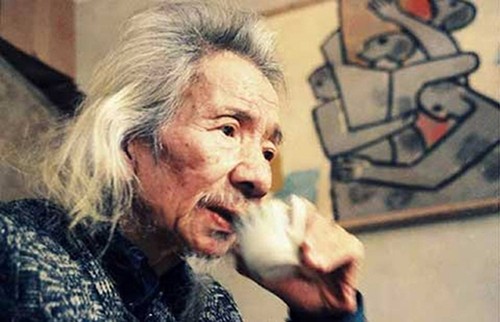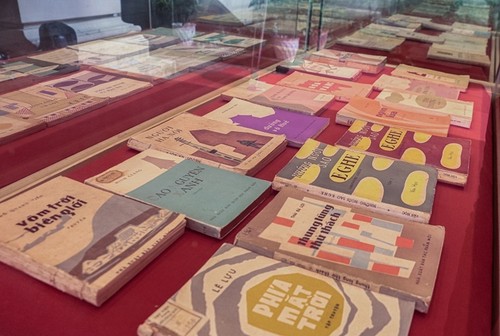 Songwriter Van Cao (1923-1995) (Photo: Nguyen Dinh Toan) Songwriter Van Cao (1923-1995) (Photo: Nguyen Dinh Toan) |
“Tien Quan Ca” (Marching Song) composed by composer Van Cao was chosen by President Ho Chi Minh in August 1944, as the National Anthem of the Democratic Republic of Vietnam, now the Socialist Republic of Vietnam.
“Marching Song” is a pinnacle in Van Cao’s career. His compositions left imprints of innovation and pioneering and shaping the form of love songs, epics, and revolutionary music.
Many of Van Cao’s works have been well received by the public for their romance and profound artistic values in the lyrics and music, such as: “Sad Autumn” (Buồn tàn thu), “Heaven” (Thiên Thai), “Spring Wharf” (Bến Xuân), “Lonely Autumn” (Thu cô liêu), and “Old Musical Instrument” (Cung đàn xưa).
Van Cao’s revolutionary songs are filled with heroic and optimistic spirit, such as “Lo River” (Trường ca sông Lô), “Bac Son” (Bắc Sơn), “Vietnamese Soldiers” (Chiến sỹ Việt Nam), “Vietnam Navy” (Hải quân Việt Nam), “Vietnam Air Force” (Không quân Việt Nam), “Advancing to Hanoi” (Tiến về Hà Nội), and “Praise of President Ho” (Ca ngợi Hồ Chủ tịch). Van Cao's revolutionary songs demonstrate his foresight into the trajectory of the resistance war and the nation's developmental journey. Over the decades, his songs continue to reside in the hearts of the public, leaving profound and enduring impressions.
 Van Cao is the author of some book covers (photo: dangcongsan.vn) Van Cao is the author of some book covers (photo: dangcongsan.vn) |
Some people share the feeling: “Van Cao’s music music has been absorbed in my mind since my first days at school. They are “Marching Song”, Vietnam’s national anthem, “My Village” – a song in the music textbook, and the triumphant melody of “Advancing to Hanoi” that we heard on every anniversary of Hanoi’s liberation.”
“Van Cao’s songs have strong vitality in the development of Vietnamese music. These songs illustrate the listener’s mind with music, images, and poetry which can only be produced by Van Cao.”
“Van Cao’s works convey strong messages and promote creativity. His songs are proof of eternal vitality.”
Van Cao is renowned as a distinguished poet who, during his lifetime, published a sole collection of 28 poems titled "Leaf." Following his demise, the "Anthology of Van Cao’s Poems" was unveiled, featuring 59 poems. Despite the limited quantity of his works, Van Cao crafted a poetic realm replete with imagination and a skillful arrangement of words, capable of evoking the senses of any reader. Additionally, Van Cao ventured into the realm of short stories and other literary creations.
Do Anh Vu of VOV’s Literature and Arts Department, VOV6, said: “Van Cao possesses a distinctive trait in his poetry, seamlessly merging elements of painting and music. His poems offer readers the opportunity to appreciate both the visual allure of painting and the auditory beauty of music. In essence, Van Cao can be described as a multi-talent artist - a poet, a musician, and a painter all rolled into one”
As of now, only a limited number of individuals are acquainted with Van Cao's identity as a painter. His artistic legacy encompasses over 1,000 oil paintings, illustrations, and book covers. Notably, Van Cao's works, such as "Thai Ha Hamlet on a Rainy Night" and "Dance of Suicides," were featured in an art exhibition in 1943.
Furthermore, during the period from 1970 to 1980, he predominantly contributed distinctive and captivating illustrations to the Literature and Arts (Văn Nghệ) newspaper, showcasing a highly unique and personal artistic style.
Endowed with a gift for poetry, music, and painting, Van Cao is acclaimed by numerous researchers as "a genius in the annals of Vietnamese literature." Remarkably, he didn't partake in formal training programs within these domains, instead, his accomplishments predominantly sprang from his innate artistic talent.
Dr. Nguyen The Ky, former President of VOV, said: "Van Cao transcends being merely a composer; he is a trailblazer. In addition to his role as a revolutionary fighter, he spearheaded a revolution in art—a formidable undertaking. Revolutionizing art is a formidable task, but Van Cao accomplished it through innovation, amplifying the voice of a nation and leaving distinct, personal imprints. Van Cao stands out as the artistic genius of Vietnamese music, painting, and poetry."
In recognition of his substantial contributions to Vietnamese culture and art, Van Cao received numerous prestigious awards from the State. These include the Ho Chi Minh Order, the Independence Order (1st and 3rd class), the Revolution Order (1st class), and the Ho Chi Minh Award for Literature and Art (first round in 1996).
As a tribute to his artistic talent and enduring contributions to Vietnam, streets in Hanoi, Ho Chi Minh City, Hai Phong (his hometown), Nam Dinh, Hue, and Da Nang bear his name.